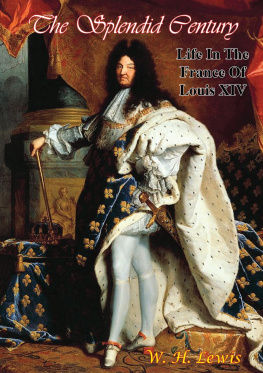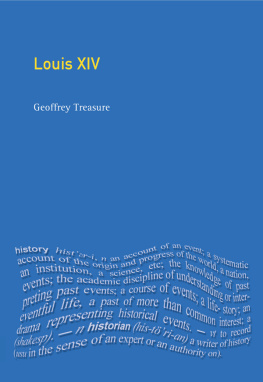FRANCE IN THE EIGHTEENTH CENTURY

LOUIS XIV, THE SUNKING
THE history of Francein the eighteenth century justly claims the attention of the student ofpolitics, of society, and of literature. The last hundred years have witnessedpolitical and social modifications more important than those of any era sincethe institution of Christianity and of the Roman Empire. In the intellectualmovement of the years preceding, we must seek the origin, the vivifying cause,of the changes which have so rapidly transformed modern civilization, andduring those years it is certain that France exercised the greatest influenceof any European state.
Few now deny that theFrench Revolution affected profoundly and permanently forms of government andconditions of society. Even those who are most eloquent in denunciation of itscrimes admit that its results have changed the face of Europe. The causes of amovement of such importance can be traced far back, but in a general way it maybe said that the conditions which determined its nature and controlled itsconsequences are to be sought between the death of Louis XIV. and the meetingof the States General. It was impossible that a monarchy like that of theBourbons, or institutions such as those of the old rgime, should continueindefinitely in France, but it was uncertain how long that form of governmentcould exist, and what would be the beliefs and the influence of the Frenchpeople when old traditions had passed away. The three quarters of a centurywhich precede 1789, though less dramatic and less lurid than the era of theRevolution, can be studied with equal profit by those who seek to know therecord of the past, in order to derive from it lessons for the present, andadmonitions for the future.
The reign of Louis XIV.extended over seventy years, and in so long a period it largely modified theinstitutions and the power of France. Her European position was far morecommanding at the close of the seventeenth century than at its beginning. Alikein political power, in the influence exercised by her society, in the attentionattracted by her literature, France was confessedly the leading state ofEurope. Additions of new territory had increased her strength and her prestige;they had gratified the pride of a people which has always been eager to extendthe boundaries and the influence of the fatherland. The aggrandizement ofFrance during the seventeenth century is not to be condemned as the result of aseries of piratical excursions. The growth of nations by the absorption ofsmaller communities, adapted by situation and by race to assimilate with thelarger body, has been the law of European progress. Thus France has been builtup. Thus Italy has been consolidated in our own days. The greatest subdivisionof Europe coincided with the worst condition of the poor, and the lowest phasesof general intelligence. The unification of great nations, in the past as inthe present, has attended the development of civilization. The early successesof Louis XIV. were followed by reverses, and his reign ended in disaster. Itwas shown that the omnipotence of the master was not accompanied by omniscience;a severe rule became irksome when its results were defeat abroad and distressat home. But the feeling of relief that welcomed the death of the old king wasfar from being a desire for any radical change in the system of government. Thechild who succeeded to the throne was an object of affection and veneration tothe entire nation. When he was dangerously ill, every one was in consternation;his recovery was greeted by demonstrations of delight which were universal andunfeigned. Bourgeoisie united with nobility in a common glee; the fisherwomenof the market were as exuberant in their joy as the courtiers of the Louvre.
The regency of the Dukeof Orleans lasted only eight years, but it was not without a considerableeffect upon the destinies of the country. It was a break in the political andthe religious traditions of the reign of Louis XIV. The new activity impartedto business during this period was an event of equal importance. Nothing ismore erroneous than to suppose that constantly increasing misery at lastexcited revolt against the government and the institutions of the old rgime.The Revolution in France at the close of the eighteenth century was possible,not because the condition of the people had grown worse, but because it hadbecome better. The material development of that country, during the fifty yearsthat preceded the con vocation of the States General, had no parallel in itspast history. Neither the weight of taxation, nor the extravagance of thecourt, nor the bankruptcy of the government, checked an increase in wealth thatmade France in 1789 seem like a different land from France in 1715. The lot oflarge classes was still miserable, the burden of taxation upon a large part ofthe population was still grievous, there were sections where Arthur Young couldtruly say that he found only poverty and privileges, but the country as a wholewas more prosperous than Germany or Spain; it was far more prosperous than ithad been under Louis XIV. An enthusiastic observer declared that one seemed tobreathe in that fair land the perfume of public felicity.
Such an improvement inmaterial conditions necessitated both social and political changes. In the mostdisastrous periods of French history, an alteration in the form of government,effected by the community at large, would have been impossible. Hunger anddespair might excite a Jacquerie, bands of starving savages might burn thecastle of a gentleman and murder his family, but such excesses had no permanentresult. The villeins of a feudal lord, ignorant, miserable, mentally inert,were as incapable of attempting important political changes as were the beaststhey tended. The bourgeoisie, though more prosperous and more intelligent, borelittle resemblance to the same class in the eighteenth century. A revolutionlike that of 1789 was impossible until the condition of the people, bothmaterially and mentally, was far removed from what it had been in the HundredYears' War, or even during the era of the Fronde. Dense ignorance was stillwidespread in France in the latter part of the eighteenth century, but theintellectual condition of the middle classes had been largely, and that of thelower classes somewhat modified. The proportion of the peasantry capable ofmental action more varied than providing for physical needs was larger underLouis XVI. than under Louis XIV. In the cities, and among the middle and upperclasses, increased activity and freedom of thought were among the most strikingfeatures of the age. The wealthy merchant no longer viewed society as did thebourgeois who kept a little shop on the Pont Neuf under the Valois kings."The merchants have discarded their former dress," said Voltaire,"politeness has gained the shop." Even this change in manners was symbolical.But while social conditions had altered, political institutions remainedunchanged. New wine had been poured in, but the old bottles were still used.Tailles and corves were no more severe in the eighteenth than in the fifteenthcentury, but they were more odious. A feudal privilege, which had then beenaccepted as a part of the law of nature, was now regarded as contrary tonature. The preeminence of birth, which had been freely accorded by themerchant and the member of Parliament of the seventeenth century, was gallingto their descendants. The member of the third estate, who felt that in wealthand intelligence he was the equal of a social superior, chafed at distinctionswhich were the more strenuously insisted upon as they began to be questioned.Thus a demand for social equality, for the abolition of privileges andimmunities by which any class profited at the expense of others, was fosteredby economical changes. It received an additional impetus from the writings oftheorists, philosophers, and political reformers.












